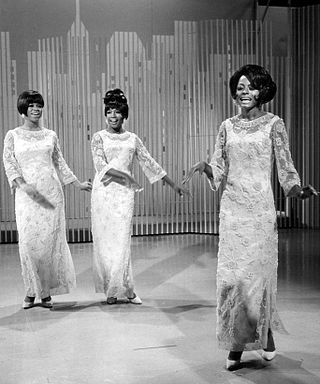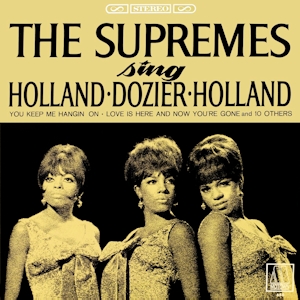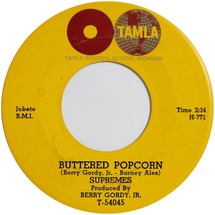Related Research Articles

The Supremes were an American girl group and a premier act of Motown Records during the 1960s. Founded as the Primettes in Detroit, Michigan, in 1959, the Supremes were the most commercially successful of Motown's acts and the most successful American vocal band, with 12 number-one singles on the Billboard Hot 100. Most of these hits were written and produced by Motown's main songwriting and production team, Holland–Dozier–Holland. It is said that their breakthrough made it possible for future African-American R&B and soul musicians to find mainstream success. Billboard ranked the Supremes as the 16th greatest Hot 100 artist of all time.
"Someday We'll Be Together" is a song written by Johnny Bristol, Jackey Beavers, and Harvey Fuqua. It was the last of twelve American number-one pop singles for Diana Ross & the Supremes on the Motown label. Although it was released as the final Supremes song featuring Diana Ross, who left the group for a solo career in January 1970, it was recorded as Ross' first solo single and Supremes members Mary Wilson and Cindy Birdsong do not sing on the recording. Both appear on the B-side, "He's My Sunny Boy".

"Baby Love" is a song by American music group the Supremes from their second studio album, Where Did Our Love Go. It was written and produced by Motown's main production team Holland–Dozier–Holland and was released on September 17, 1964.

"Come See About Me" is a 1964 song recorded by the Supremes for the Motown label. The track opens with a fade-in, marking one of the first times the technique had been used on a studio recording.

"Love Child" is a 1968 song released by the Motown label for Diana Ross & the Supremes. The second single and title track from their album Love Child, it became the Supremes' 11th number-one single in the United States, where it sold 500,000 copies in its first week and 2 million copies by year's end.

"I Hear a Symphony" is a 1965 song recorded by the Supremes for the Motown label.

The Supremes Sing Holland–Dozier–Holland is the tenth studio album released by The Supremes for Motown in 1967. It includes the number-one hit singles "You Keep Me Hangin' On" and "Love Is Here and Now You're Gone". As the title states: all songs on the album were written and produced by Motown's main songwriting team of Holland–Dozier–Holland. Most of the album was recorded during the spring and summer of 1966; however several songs date back to the summer of 1964.

Meet the Supremes is the debut studio album by The Supremes, released in late 1962 on Motown.

A Bit of Liverpool, released as With Love (From Us to You) in the UK, is the third studio album by the Supremes, released in the fall of 1964 on the Motown label. It was produced by Berry Gordy with Hal Davis and Marc Gordon doing the mixing.

The Supremes at the Copa is a live album by Motown singing group the Supremes, recorded during their debut engagement at the prestigious Copacabana nightclub in New York City. Released in the late fall of 1965, At the Copa was the first live album issued by the Supremes, and the only live album issued by the group's best-known lineup of Diana Ross, Florence Ballard and Mary Wilson.

"Forever Came Today" is a 1968 song written and produced by the Motown collective of Holland–Dozier–Holland, and was first made into a hit as a single for Diana Ross & the Supremes in early 1968. A disco version of the song was released as a single seven years later by Motown group the Jackson 5.

"Your Heart Belongs to Me" is a 1962 song written and composed by The Miracles' William "Smokey" Robinson and released as a single by Motown singing group The Supremes during their early years with the label. The song is about a woman whose lover is in the armed forces and has "Gone to a far-away land"; its narration has her tell him to always remember their love for each other if he ever gets lonely.
"A Breathtaking Guy" is a 1963 song written and produced by Smokey Robinson and released first by Motown singing group The Supremes (1963) and later by The Marvelettes (1972). The single was originally released under the title "A Breath Taking, First Sight Soul Shaking, One Night Love Making, Next Day Heartbreaking Guy" by The Supremes, but was shortened after its official release. All three Supremes members - Diana Ross, Florence Ballard and Mary Wilson - sang the chorus with the original title together.

"When the Lovelight Starts Shining Through His Eyes" is a song written by Holland–Dozier–Holland and recorded in 1963 by Motown singing group The Supremes. It is notable as the Supremes' first Billboard Hot 100 Top 40 recording, following seven previous singles between January 1961 and September 1963 which failed to enter the Top 40. The single is also notable as the first Supremes single written and produced by Holland–Dozier–Holland, who had previously created hits for Martha and the Vandellas and Mary Wells.

"Nothing but Heartaches" is a 1965 song recorded by The Supremes for the Motown label.

"In and Out of Love" is a 1967 song recorded by The Supremes for the Motown label. It was the second single issued with the group's new billing of Diana Ross & the Supremes, the penultimate Supremes single written and produced by Motown production team Holland–Dozier–Holland, and the last single to feature the vocals of original member Florence Ballard.

"Buttered Popcorn" is a 1961 song written by Motown executives Berry Gordy and Barney Ales, produced by Gordy, and released as a Tamla label single by Motown singing group The Supremes. It was the group's second single after signing with Motown Records as well as their second, and last, single for the Tamla label, before moving to the Motown label.

"I'll Try Something New" is a song written by Smokey Robinson and originally released in 1962 by The Miracles on Motown Records' Tamla subsidiary label. Their version was a Billboard Top 40 hit, peaking at #39, and just missed the Top 10 of its R&B chart, peaking at #11. The song was released later as a joint single by Diana Ross & the Supremes and The Temptations, also becoming a charting version on the Billboard 100 pop singles chart, peaking for two weeks in April 1969 at number 25.

"No Matter What Sign You Are" is a song released for Diana Ross & the Supremes by the Motown label.

"Where Did Our Love Go" is a 1964 song recorded by American music group the Supremes for the Motown label.
References
- ↑ The Complete Motown Singles Vol 2: 1962 [CD liner notes]. New York: Hip-O Select/Motown/Universal Records.
- ↑ Billboard Feb. 2, 1963
- 1 2 "US Charts > The Supremes". Allmusic . Retrieved 2015-10-01.
- ↑ Billboard R&B Dec. 29, 1962
- ↑ "The Supremes Chart History (Hot 100)". Billboard.
- ↑ "The Supremes Chart History (Hot R&B/Hip-Hop Songs)". Billboard.
- ↑ "CASH BOX Top 100 Singles". Cashbox . January 26, 1962. Retrieved 31 December 2020.
- ↑ "The CASH BOX Top 50 In R&B Locations". Cashbox . December 22, 1964. Retrieved 31 December 2020.